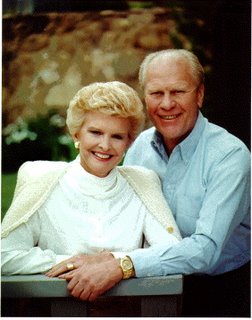About Jerry Ford (1913 - 2006)
>
 I know it isn't all about me, but I'm pleased that by chance I posted a photo here of Jerry and Betty Ford mere days before the former president died. Of course it was Mrs. Ford I was writing about, and the courage pushing on into heroism she displayed in making public her struggles, first with breast cancer and then with substance abuse. Still, it seemed appropriate to portray them together, partly because they so clearly thought of themselves that way, but also because in both cases--and probably especially with the even riskier decision to go public with her substance-abuse problems--it clearly was a family matter.
I know it isn't all about me, but I'm pleased that by chance I posted a photo here of Jerry and Betty Ford mere days before the former president died. Of course it was Mrs. Ford I was writing about, and the courage pushing on into heroism she displayed in making public her struggles, first with breast cancer and then with substance abuse. Still, it seemed appropriate to portray them together, partly because they so clearly thought of themselves that way, but also because in both cases--and probably especially with the even riskier decision to go public with her substance-abuse problems--it clearly was a family matter.This may not sound like much of a compliment, but I think it is one: Maybe the nicest thing I can say about Jerry Ford is that here for once is a former high-ranking official we don't have to lie about. Oh, some people will pretend he was a better president than he was, but at the same time no one is forgetting the pall cast over his presidency by the possibly understandable but nevertheless terrible decision to pardon the man who made him vice president, Richard Nixon.
And for once, glory be, we can say good-bye to a decent human being. He lived a full life, and at 93 had clearly been failing healthwise in recent years. It's hard to feel that he was cheated there.
Since everyone so far is stressing his old-school "friendship across the aisle" approach to politics, I was relieved to hear Andrea Mitchell recall on MSNBC that "he could be very partisan when he was minority leader in the House." But, just as everyone is stressing, it was a very different school of partisanship from the scorched-earth version of, say, Karl Rove and Tom DeLay and Doctorbill Frist.
And for all the difficulties of the Ford presidency, I think Andrea Mitchell was also unquestionably right in saying that Ford "left the presidency in better shape than when he inherited it." And perhaps younger folks can't fully appreciate that accomplishment because the nation tolerated the scumbag Nixon's decades-long whitewashing of his reputation, and indulged in such an orgy of lying when the old turd finally died. The road map for a president trashing the Constitution was drawn by Nixon.
Chris Matthews, to his credit, explained lucidly tonight on MSNBC why the Nixon pardon was so devastating--at a time when the government had taken to large-scale lying and cover-up, and to vilifying the press that, however feebly, had to try to penetrate to the truth, the country needed to get the truth out. Ford thought he was doing us a favor by putting Watergate behind us. The problem was that we needed first to know what exactly we were getting beyond. Matthews later expressed doubt that Ford, not exactly a deep thinker, even imagined the depth of feeling the pardon was going to generate, that he did it "without fully grasping the consequences."
As I write, MSNBC has finally gotten Keith Olbermann on, and not surprisingly he is reminding us of some of the darker realities of the Ford presidency--but without diminishing the sense of relief it brought a country in need of it. He even makes the case in favor of the Nixon pardon, or at least appreciates the courage it took to put his own reputation on the line for the sake of the theory that the country couldn't stand a protracted period of investigation and prosecution of the former president.
Every now and then an outraged voice of "fairness and balance" demands to know why we won't give George W. Bush credit for being a sincere, decent patriot doing his best to grapple with difficult problems. The answer is obvious, though always hard to express: because he's not. There isn't a sincere or decent cell in his carcass.
All you have to do is set him alongside this sincere, decent patriot, Gerald Ford.



1 Comments:
Too bad about the "national nightmare" of 200,000 East Timorese that were killed off with decent Jerry's blessing; or his telling NYC to drop dead. The last decent Republican? Try just another Red State factotum with no trust in the resiliency of the American people to manage our "crises", be they criminal Presidents or terrorist attacks or whatever may come tomorrow. Internationally, he green-lighted the massacre of the Timorese; here at home, he elevated the Capitol Hill crowd to the level of royalty above the laws they impose on the unwashed, setting the stage for future pardons (Iran-Contra) and tailor-made judicial decisions (Bush v. Gore). But why sweat the details?
Post a Comment
<< Home